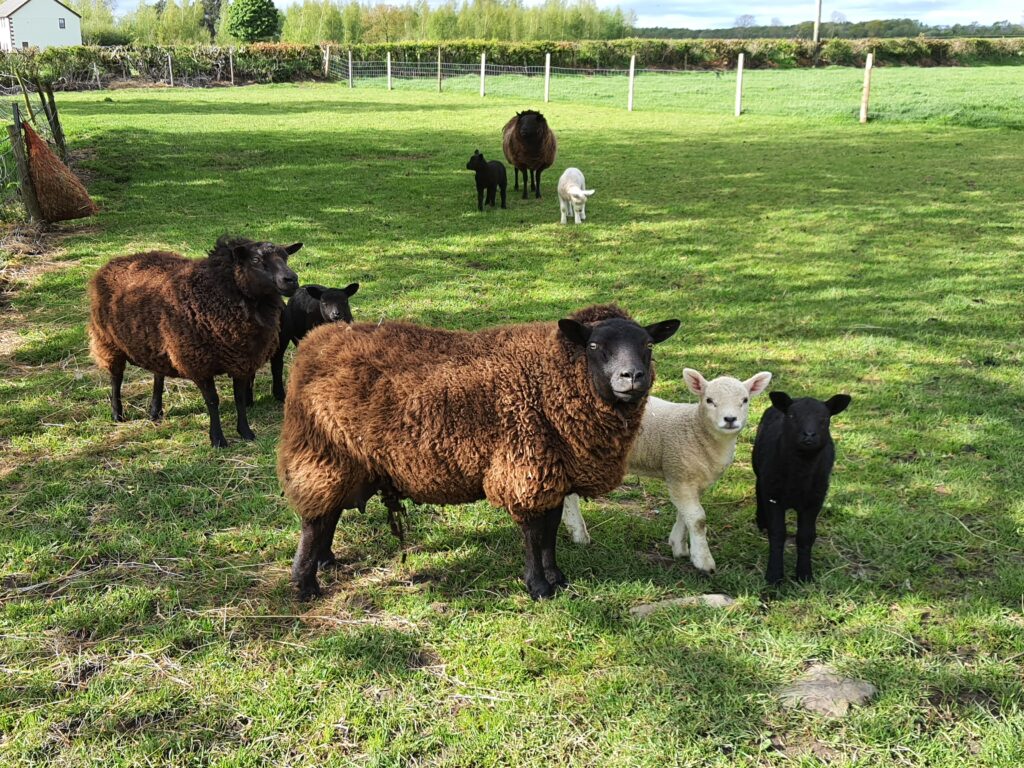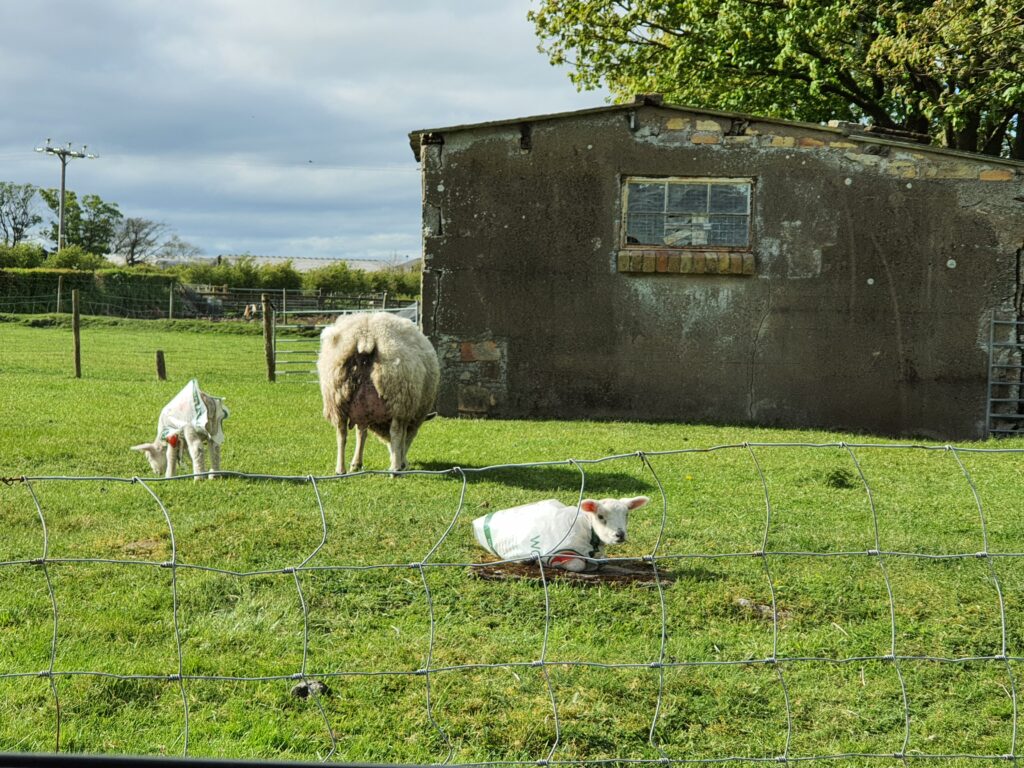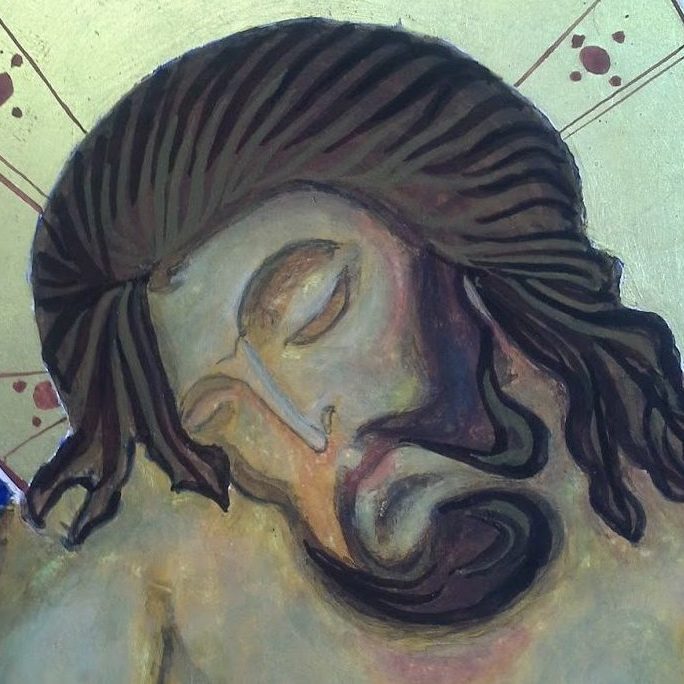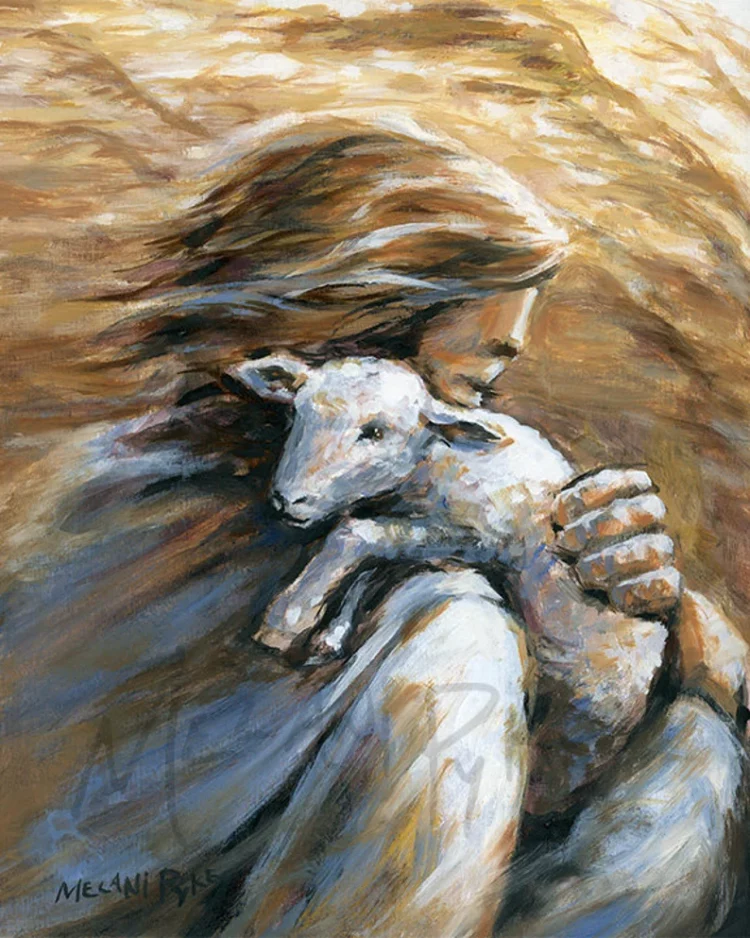I’ve just been away on holiday. I suppose any holiday in the English Lake District will inevitably involve encounters with sheep. I saw plenty of the beautiful Herdwick sheep which are such a feature of the Lake District fells, and there were lots of lambs. One day I stopped at a smallholding where there were lambs in a small paddock at the side of the house. I got out of the car to take a photo, and have a chat with the owner – an elderly man, a retired farmer, I guess, who still keeps a few sheep as a hobby.
I asked about these strange black sheep with the beautiful black and white lambs: they are Hebridean sheep, apparently.

And then I asked about the little white sheep with the plastic coats: their mum wasn’t feeding them properly so he’d been feeding them himself from a bottle, to start with. At 3 in the morning he decided they were cold, so he cut up a plastic sack to make little coats for them to keep the heat in. Eventually, he said, he tied the mother down, and put the sheepdog to lie down next to her: she settled down and got the hang of feeding her little ones at last.

I asked if I could take a photo of the Hebridean sheep, which he said I could. He called them – and they came running from the far side of the paddock and stood very close to us. They’re very cute and very noisy, and they know the voice of their shepherd!
Our Gospel reading today talks about Jesus’ sheep, his flock, hearing his voice, recognising him and following him. In contrast, there were others who didn’t recognise his voice: it wasn’t that Jesus wasn’t speaking – in words and in deeds – just that they weren’t listening. These are sheep of someone else’s flock. This is interesting because it makes us think about whose voice we listen to, whose voice we choose to follow, and also about paying attention: do we really listen to the voice of the Good Shepherd?
There are many ‘voices’ clamouring for our attention these days. Think of all those TV ads – fast and furious or slow and seductive: then there are politicians, lifestyle gurus, experts in all kinds of things, friends and family. I think we have ‘visual voices’ today as well: pictures of gorgeous clothes on beautiful bodies, perfect homes full of expensive ornaments and luxurious furniture, the latest trends and designs, this season’s colours, new cars. Even if we can’t afford to keep up with all the latest things (which most of us can’t) these images are still very seductive: it’s easy to find yourself drooling from a distance.
Somehow, amongst all this clamour, we have to learn how to pick out the voice of the Good Shepherd. How do we know when it’s his voice, and when it’s not? This is where our knowledge of the Gospels is essential: this is the place where we are able to be practical followers – discerning the voice of the Shepherd amongst all those other voices we hear. We hear him saying ‘We do not live by bread alone’, ‘blessed are the poor, for theirs is the Kingdom of Heaven’ , ‘let the one without sin cast the first stone’, ‘Love your enemies! Pray for those who persecute you!’, ‘think of the birds of the field – they neither sew nor spin’. We hear his stories: a man went down from Jerusalem to Jericho and fell among thieves: there was a man who had two sons: there was a shepherd who had 100 sheep, a woman who lostt a coin,a mustard seed that grew into a huge tree. These familiar stories, often-heard words, help us to know when we are being lured with untruths or tempted by lies. Living as a Christian in a clamorous world means having these words, these stories, in our hearts and learning to live by what they tell us.
Sometimes, situations are confusing: maybe neither option is good, or both ways are possible. This is where our lives of prayer are important. As we pray, if we listen rather than just talk, we learn to discern the voice of the Shepherd. Seeking the advice of wise friends is good too, especially if they are people of faith. Sometimes you have to make a choice, not sure if it’s the right one: in this case, let the Good Shepherd take you by the hand and walk with you into the uncertainty.
I keep thinking of that mother sheep which the shepherd had to tie down in order to make her feed her lambs. What struck me most was the kindness with which the sheepdog was allowed to snuggle down next to the sheep, helping her to settle. What a beautiful image. In times when we feel tied down, times when we struggle or have to do things we don;t really want to, we too are sent a comforter; the Holy Spirit is there with us, if we stop to sense her presence – the brooding, warm Spirit of God, within and around us, giving us strength and courage wherever we are, wherever we travel. Amen
Tweet
